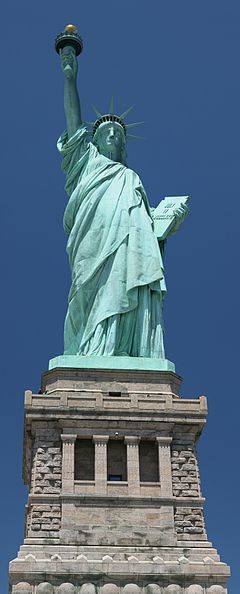
Summer is the season for revolutions. People take to the streets when it's hot. On the 22nd of August, in 1642, for instance, Charles I raised his standard at Nottingham, and the English Revolution began. On the 14th of July, in 1789, the Bastille was stormed and the French Revolution started; and 13 years earlier, on the 4th of July, 1776, 56 American revolutionaries signed the Declaration of Independence.
Nobody should have expected they'd make any difference. Revolutions had never amounted to much. Empires had come and gone, but there had always been emperors. Dynasties had been overthrown, but there had always been kings. "What has been is what will be, and what has been done is what will be done," Solomon is supposed to have written. "And there is nothing new under the sun."
Then suddenly, after the 22nd of August, 1642, and the 14th of July, 1789, and the 4th of July, 1776, things started to change. Kings were sent to the guillotine, or to the block. And they came back at the invitation of parliament; or they never came back.
What, after generations of revolutions, made democracy happen? Was it Enlightenment philosophy? Was it the Puritan religion? Was it the rise of capitalism? Was it the decline of parasite loads? I favor a simpler answer. People finally became free, because they were free to leave.
On the eve of the English Revolution, when, in December of 1641, parliament presented Charles I with its Grand Remonstrance, members were able to threaten: "great numbers to avoid their miseries had departed out of the kingdom, some into New England and other parts of America." Their list of 202 complaints had passed by a margin of just 11 votes. If it hadn't, Oliver Cromwell confided, "I would have sold all I had the next morning, and never seen England any more."
When John Locke, the son of a cavalry captain for the parliamentary forces in the English Revolution, put together his Two Treatises of Government a generation later, he was obsessed with the state of nature. In the first ages of the world, the patriarchs wandered over vast tracts of wilderness, he thought, not unlike America's wild woods and uncultivated wastes. Where it was easy to avoid strife by spreading out. "The Inhabitants were too few for the Country, and want of People and Money gave Men no Temptation to enlarge their Possessions of Land." So government was by consent of the governed.
By the end of the 18th century, there were over 4 million people in the United States, mostly of British descent. And they were unhappy about paying taxes to the overlords they'd left in their wake. So, on the 4th of July 1776, 56 signers endorsed a Declaration of Independence. Again and again, they had warned their British brethren. "We have reminded them of the circumstances of our emigration and settlement here. We have appealed to their native justice and magnanimity." They had been deaf. It was time to act.
Thomas Jefferson, who was an admirer of John Locke, understood that their egalitarianism had something to do with their emigration. He talked about the natural right of all men to leave any country in which chance, not choice, had put them, in order to look for a better place to live. And he pointed out, in his First Inaugural Address, that his fellow Americans had found one. "Possessing a chosen country, with room enough for our descendants to the thousandth and thousandth generation," they were entitled to a "wise and frugal Government," that would never "take from the mouth of labor the bread it had earned."
By the time Thomas Jefferson read that address, there had been a revolution in France. And, just 5 months after Louis XVI was guillotined, a constitution of 1793 had promised French citizens equality, liberty, safety, the rights of property, the inviolability of the national debt, freedom of worship, a common education, public assistance, unlimited freedom of the press, the right of petition, the right to assemble in popular societies and the enjoyment of all the rights of man.
Those citizens were inspired by the son of a Geneva watchmaker, Jean-Jacques Rousseau. Like Locke, Rousseau was an admirer of the state of nature. "When I see multitudes of completely naked Savages scorn European voluptuousness and brave hunger, fire, the sword and death, in order to preserve nothing but their independence, I feel that it is not for Slaves to reason about freedom," he wrote in his second Discourse on Inequality. And like Jefferson, Rousseau hoped that freedom could be recovered under a social contract. Far from destroying natural equality, it would substitute equal "moral and lawful" rights. History might, or might not, bear him out.
More than two hundred years after the English Revolution was over, and more than a century after the American Revolution began, a statue was set up on Ellis Island as a gift from the people of France. She carries a tablet with the date of the Declaration of Independence in her left arm; she holds up a torch of liberty in her right hand. And on the pedestal, these words appear:
"Give me your tired, your poor,
Your huddled masses yearning to breathe free,
The wretched refuse of your teeming shore.
Send these, the homeless, tempest-tossed to me,
I lift my lamp beside the golden door!"
May she make it through many more summers.
References:
http://laurabetzig.org/pdf/PLS09.pdf
Betzig, Laura. 1996. Monarchy. In, The Encyclopedia of Cultural Anthropology, David Levin and Melvin Ember, eds, pp. 803-805. NY: Henry Holt.
Photo by David Paul Ohmer Credit:
http://www.flickr.com/photos/the-o/2928233768/
Sound Link:




